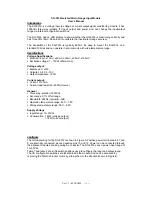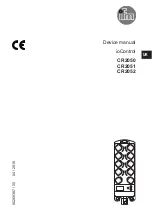
- Number of rings announcing the call can be pro-
grammed from the entry panel (one non-program-
mable ring announces a call with the doorbell).
- Call can be rerouted to another receiver.
If the user called does not answer, the call can be
rerouted to another receiver by programming with
MPP/300LR or PCS/300.
- Audible signal to indicate system busy.
Optional functions
The receiver can accommodate the modules YPL
and YP3 and loudspeaker YAL to implement its
standard functions.
• With YPL module:
- call disabling (Privacy) with warning light;
- call attenuation;
- door open warning light;
- warning that porter switchboard is trying to get in
touch.
• With YP3 module:
- intercom calls (max. 6) with VSE/301 selector or
for activating auxiliary services with actuators.
- call transfer in intercom mode.
If there is a call from the entry panel during a con-
versation between intercom sets, a short audible
signal repeated every 5 s advises the receiver’s
user of the call. By pressing one of the call buttons
and hanging up, the conversation can be transfer-
red to another receiver.
The receiver receiving the transferred call can, in
turn, transfer the call.
• With YAL loudspeaker:
- call note made more powerful.
Function of jumper SW1
(Call attenuated and management of calls acti-
vating a number of receivers)
Normally supplied ready inserted. Remove the jum-
per
SW1
(fig. 10) in the event the volume of the call
note is to be attenuated, or if you have a number of
receivers activated by the same call.
NOTE. If jumper SW1 is turned off, all the YPL acces-
sory, where installed, can do is disable the call note.
Maximum number of receivers activated by same call:
- 3 with normal call (jumper SW1 inserted);
- 2 with normal call and 6 with attenuated call (jum-
per SW1 not inserted).
WARNING. Loudspeaker YAL should be considered
as a receiver.
Function of jumper SW3
(Resistive load termination)
The unit features a jumper
SW3
(fig. 10) for the
impedance terminating the signal line.
Remove the jumper if the line continues towards
other video handsets.
Function of jumper SW9
(Selects power source)
The video handset has a jumper
SW9
(fig. 10) for
selecting the type of power supply (from BUS or a
separate power supply unit).
For power supply from X1 BUS
(max. 1 video hand-
set active only)
, position jumper
SW9
on
BUS
(default setting).
For separate power supply, position jumper
SW9
on
LOCAL
(as additional receiver for a simultaneous
call, use in X2 installations, or if the YV-YVC monitor
module is disconnected).
Entry panel selection in installations with a
number of entry panels
To use this function, turn on the monitor by pressing
the button entry panel activation
.
Next, press the same button again to select the
entry panels.
STANDARD PROGRAMMING
(without using relevant programmers)
To programme the call in system 300 or X1 (X2)
installations, see the literature enclosed with the
XA/300LR control unit and X2 entry panel.
To programme calls 2 and 3, where necessary, sim-
ply press the corresponding keys following the first
call button.
NOTE. Do not exit receiver programming mode until
you have associated all the desired calls.
To programme intercom calls, see the instructions
provided with the VSE/301 selector.
PROGRAMMING WITH MPP/300LR
OR PCS/300
The unit can be programmed through the
MPP/300LR unit using the dedicated profile for the
4
GB
INSTRUCTIONS FOR USE
AND INSTALLATION
WARNING FOR THE INSTALLER
These instructions should be attached to the
apparatus.
YKP/301 WALL MOUNTING WITH HANDSET
This mounting is designed to accommodate moni-
tor module YV or YVC and units YP3 and YPL in
system X1 installation.
Loudspeaker YAL can also be inserted if the call
note needs to be more powerful.
YKP/301+YV MONITOR WITH HANDSET
Receiver compatible with the system X1 (power
supply integrated in BUS).
It features the following controls (fig. 1):
Door lock release (
1
)
Entry panel activation/selection (
2
)
Auxiliary 1 (
1
)
Auxiliary 2/Porter call
Brightness
Contrast
(
1
) This control can only be used if the unit is on
.
By using actuators VLS/300 or customizing control
unit XA/300LR by means of programmer
MPP/300LR or PCS/300, you can have the control
enabled at all times.
(
2
) The unit can only be switched on and conse-
quently connected to the entry panel if the system is
not engaged with other calls.
WARNINGS FOR THE USER
- Please do not open or tamper the device (high
voltage!).
- Please avoid knocking or bumping the appara-
tus as it could result in the breakage of the pic-
ture tube and the consequent projection of glass
fragments.
- In the case of breakdown or modification of the
apparatus of the system (such as power sup-
plier...) please contact a specialized maintenan-
ce service.
YKP/301+YVC COLOR MONITOR WITH HANDSET
Features similar to YKP/301+YV, it has a colour
saturation control
instead of the contrast control
(fig. 1).
Standard functions
- Doorbell input.
- Stores up to 3 entry panel call buttons.
- Distinctive ringing depending on where the call is
made from (entry panel, doorbell, porter switch-
board, intercom unit).
- Call note type can be programmed to distinguish
between a call made from the entry panel (4 melo-
dies) and the doorbell (4 melodies).
re introdotti attraverso uno dei punti a rottura pre-
stabilita, situati nella parte inferiore della scatola
incasso (A di fig. 11).
Tramite la chiave maschio esagonale s 2,5 in dota-
zione svitare la vite di bloccaggio e smontare la
placca dal telaio (fig. 12).
Per il montaggio di ulteriori pulsanti seguire le istru-
zioni in dotazione agli stessi.
Togliere i due bollini di protezione dei fori filettati
nella scatola incasso e fissare il telaio tramite le due
viti in dotazione (fig. 13).
Effettuare i collegamenti. Per scrivere i dati deside-
rati sul cartellino portanome, estrarre il ferma car-
tellino e quindi il cartellino (fig. 17).
NOTA.
Si possono utilizzare cartellini portanome
personalizzati fino ad un massimo di 2 mm di spes-
sore.
Per montare la placca inserire prima la parte supe-
riore nella testata e quindi, tramite una chiave
maschio esagonale s 2,5, avvitare la vite di bloc-
caggio (fig. 18).
13
14
;;;;
;;;;
500 mm
170 mm
710 mm
170 mm
;
;
;
;
;
;
;
140 mm
530 mm
140 mm
h
500 mm
15


































